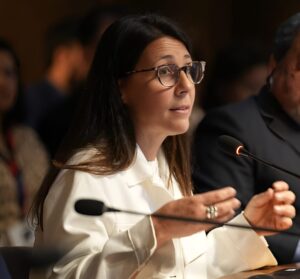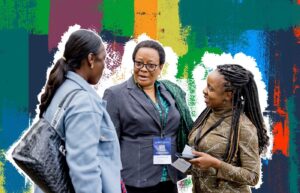-
Six Ways to Protect Democracy against Digital Threats in a Year of Elections
2024 has been dubbed the “year of elections”, with over four billion people expected to vote across more than 60…
2024,
Perspective,
Web Page
-
Digital Governance Fact Sheet 2023
2023,
Document,
PDF
-
Digital Governance: Automated Decision-Making, Algorithms, and Artificial Intelligence
2023,
,
Web Page
-
Three Recommendations for More Inclusive and Equitable AI in the Public Sector
See how OGP members are working to better understand and address the gender-differentiated impacts of algorithms, reduce human biases, and…
2023,
Perspective,
Web Page
-
Policy Brief – Bolstering Online Political Advertising Policy in Europe
This policy brief lays out the key issues to address for regulating online political advertising in Europe and proposes ideas…
2022,
Guidance Document,
Web Page
-
Algorithmic impact assessment: a case study in healthcare
Read Ada Lovelace Institute's algorithmic impact assessment for the NHS AI Lab. By trialling the process, the NHS is set…
2022,
Outbound Link,
Web Page
-
Digital Governance Fact Sheet
A look at global progress and member-level examples of digital governance work in OGP
2021,
Document,
PDF
-
Algorithm Accountability: What Government Can Do Right Now
In France, the Digital Republic Law requires that all algorithms used by the government be made open and accessible to…
2021,
Perspective,
Web Page
-
State of the Evidence: Algorithmic Transparency
This paper reviews the extent to which algorithmic transparency and accountability standards make a difference in implementation. See the “Algorithmic Transparency” chapter…
2021,
Outbound Link,
Web Page
-
Algorithmic Accountability for the Public Sector
The Ada Lovelace Institute, AI Now Institute, and OGP have partnered to launch the first global study to analyze the…
2021,
Research Product,
Web Page
-
Automated Decision-Making Systems in the Public Sector – An Impact Assessment Tool for Public Authorities
AlgorithmWatch and AlgorithmWatch Switzerland asked "How can we ensure a trustworthy use of automated decision-making systems (ADMS) in the public…
2021,
Outbound Link,
Web Page
-
Actions for Transparent and Accountable Digital Governance
Innovation and the use of digital technologies have always been an integral part of the Open Government Partnership (OGP) in…
2021,
,
Web Page
-
Open Response + Open Recovery: Open Government and Digital Governance in the Time of COVID-19
Experts from the World Wide Web Foundation, the Governments of France and Taiwan, Luminate, and Article 19 led a cross-sector…
2020,
,
Web Page
-
Digital Governance – What Role Could OGP Play?
2020,
Research Product,
Web Page
-
A Contract for the Web
By committing to this contract outlined by The Web Foundation, governments, companies and citizens around the world can help protect…
2019,
Outbound Link,
Web Page
-
"With Great Power Comes Great Responsibility": Keeping Public Sector Algorithms Accountable
In this paper, Etalab, the French government’s task force for open data and data policy, explains how they're working with…
2019,
Outbound Link,
Web Page
-
New recommendations to improve gender equality in digital professions and eliminate stereotypes in AI applications
UNESCO publication locates this prejudice in the gender imbalance of technical teams leading the development of frontier technologies and identifies…
2019,
Outbound Link,
Web Page
-
Global Report
The promise of democracy is often defined by the ballot box, where citizens determine who will represent their interests in…
2019,
,
Web Page
-
Strengthening Democracy and Protecting Civic Rights in the Digital Era
For government to be responsive, and inclusive, a robust enabling environment that protects fundamental rights and democratic institutions is critical.
2019,
,
Web Page
-
Ethics Guidelines for Trustworthy Artificial Intelligence
Explore the Ethics Guidelines for Trustworthy AI that put forward 7 key requirements that AI systems should meet in order…
2019,
Outbound Link,
Web Page
-
It's Time for a Bill of Data Rights
Luminate's Martin Tisné argues that "data ownership" is flawed and instead, we need a framework that gives people rights to…
2018,
Outbound Link,
Web Page
-
Human Rights in the Age of Artificial Intelligence
This Access Now study scopes the potential range of human rights issues that may be raised as artificial intelligence and…
2018,
Outbound Link,
Web Page
-
Mapping Regulatory Proposal for Artificial Intelligence in Europe
A bird's eye survey from Access Now on the major regulatory initiatives in artificial intelligence and the European Union and…
2018,
Outbound Link,
Web Page
-
Algorithmic Accountability Policy Toolkit
AI Now Institute offers a toolkit for legal and policy advocates that provides a basic understanding of government use of…
2018,
Outbound Link,
Web Page
-
Artificial Intelligence: open questions about gender inclusion
Artificial intelligence (AI) is shaping gender relations, creating new challenges and opportunities for women. For their personal development and professional…
2018,
Outbound Link,
Web Page
-
The Right Tools for the Right Job: How OGP can help win the fight for civic space
This paper is an OGP Support Unit/Independent Reporting Mechanism (IRM) collaboration authored by Tonusree Basu, OGP Thematic Partnerships Manager, and Denisse…
2018,
Research Product,
Web Page
-
The Guide to Opening Government: An Enabling Environment for Civil Society Organizations
A guide on commitments to improve the enabling environment for civil society organizations, published by the International Center for Not-For-Profit…
2018,
Resource,
Web Page
-
Enhancing Digital Civic Space through OGP
n/a,
Post,
Web Page
-
Open Algorithms Blog Series
n/a,
Post,
Web Page








